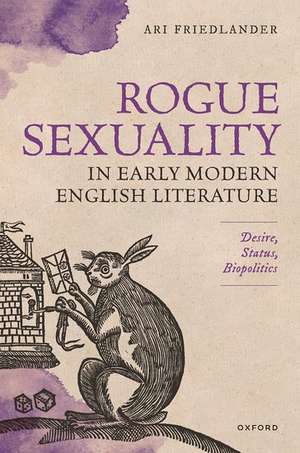Rogue Sexuality in Early Modern English Literature: Desire, Status, Biopolitics
Autor Ari Friedlanderen Limba Engleză Hardback – 23 iun 2022
Preț: 473.64 lei
Preț vechi: 561.56 lei
-16% Nou
Puncte Express: 710
Preț estimativ în valută:
90.65€ • 94.39$ • 76.61£
90.65€ • 94.39$ • 76.61£
Carte tipărită la comandă
Livrare economică 27 februarie-05 martie
Preluare comenzi: 021 569.72.76
Specificații
ISBN-13: 9780192863171
ISBN-10: 0192863177
Pagini: 224
Dimensiuni: 164 x 240 x 22 mm
Greutate: 0.5 kg
Editura: OUP OXFORD
Colecția OUP Oxford
Locul publicării:Oxford, United Kingdom
ISBN-10: 0192863177
Pagini: 224
Dimensiuni: 164 x 240 x 22 mm
Greutate: 0.5 kg
Editura: OUP OXFORD
Colecția OUP Oxford
Locul publicării:Oxford, United Kingdom
Recenzii
In Rogue Sexuality in Early Modern English Literature, Ari Friedlander does more than tell the story of Renaissance rogues (the highwaymen, con artists and sex workers of Shakespeare's England). Through dazzling readings of early modern drama (as well as canting literature, works of early demography and Paradise Lost) he shows us a new way to study the history and culture of ourselves - and how our insatiable desires helped shape the identities we carry today.
Rogue Sexuality is original, compelling, and timely. It makes a crucial intervention in early modern sexuality studies by centering labor and class (both the representation of low status and the appropriation of it by elites), and by demonstrating how a Foucaultian biopolitics illuminates concerns about poverty, sexual reproduction, and social order in early modern England. It will change how we theorize the relationship between the social and the sexual in early modern texts.
This is a tightly argued, thorough and theoretically informed account of an important subject, which succeeds in analysing rogue sexuality across a dazzling array of contexts. It is an excellent work that makes valuable contributions to the study of sexuality and class in early modern England.
Where do rogues come from? Thanks to Ari Friedlander's Rogue Sexuality in Early Modern English Literature, I now know a perfect phrase for characterizing the impulse animating this query. We may henceforth designate scholars who study Robert Greene's cony-catchers and Shakespeare's Autolycus as "Rogue Curious," which is the witty title of the first chapter in this exciting book. [...] The book's final chapters model what literary scholarship inspired by rogue curiosity might look like. Because of them, Shakespeare's Perdita proves more Autolycus than I ever thought, and Milton's Edenic pair as much rogue spouses as companionate partners. Henceforth it will be hard for me to imagine them otherwise.
[A] welcome addition to the study of social forces that shape - and are shaped by - gender and sexuality in early modern English literature....[T]his learned and evocative study, would make for excellent reading in an undergraduate or graduate course on early modern gender and sexuality studies.
Rogue Sexuality is original, compelling, and timely. It makes a crucial intervention in early modern sexuality studies by centering labor and class (both the representation of low status and the appropriation of it by elites), and by demonstrating how a Foucaultian biopolitics illuminates concerns about poverty, sexual reproduction, and social order in early modern England. It will change how we theorize the relationship between the social and the sexual in early modern texts.
This is a tightly argued, thorough and theoretically informed account of an important subject, which succeeds in analysing rogue sexuality across a dazzling array of contexts. It is an excellent work that makes valuable contributions to the study of sexuality and class in early modern England.
Where do rogues come from? Thanks to Ari Friedlander's Rogue Sexuality in Early Modern English Literature, I now know a perfect phrase for characterizing the impulse animating this query. We may henceforth designate scholars who study Robert Greene's cony-catchers and Shakespeare's Autolycus as "Rogue Curious," which is the witty title of the first chapter in this exciting book. [...] The book's final chapters model what literary scholarship inspired by rogue curiosity might look like. Because of them, Shakespeare's Perdita proves more Autolycus than I ever thought, and Milton's Edenic pair as much rogue spouses as companionate partners. Henceforth it will be hard for me to imagine them otherwise.
[A] welcome addition to the study of social forces that shape - and are shaped by - gender and sexuality in early modern English literature....[T]his learned and evocative study, would make for excellent reading in an undergraduate or graduate course on early modern gender and sexuality studies.
Notă biografică
Ari Friedlander is Associate Professor of English at the University of Mississippi. His scholarship on sexuality, class, and disability in early modern English literature has been published in SEL: Studies in English Literature, 1500-1900, JEMCS: Journal for Early Modern Cultural Studies, The Oxford Handbook of Shakespeare and Embodiment, and other venues. His research has been supported by grants from the Henry E. Huntington Library, the Andrew W. Mellon Foundation, and the Volkswagen Foundation.
